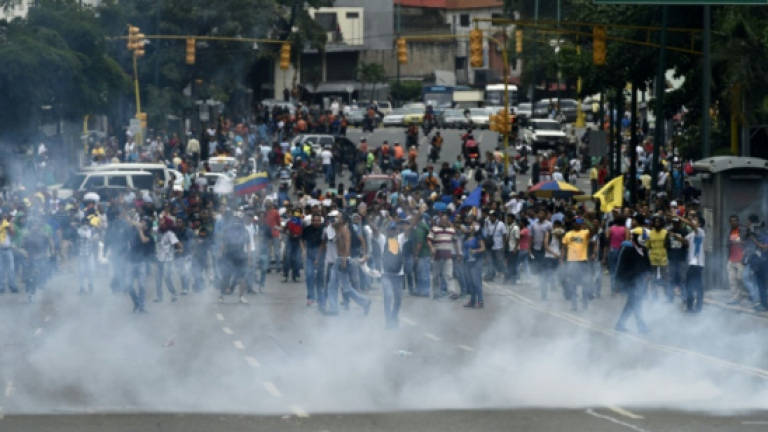Venezuela crisis draws timid international response

CARACAS: Venezuela is sinking deeper into political and economic chaos, but the international response has been timid so far — and is unlikely to put much pressure on an unbending President Nicolas Maduro, analysts say.
So far, the international community's main plan of action for Venezuela has been to call for a "great national dialogue," in the words of the former presidents of Spain, Panama and the Dominican Republic, one high-profile group trying to mediate the crisis.
But with the once-booming oil giant sliding ever deeper into recession and hyperinflation, the leftist president and his centre-right opponents are so far apart that "dialogue" seems impossible.
The opposition, which won control of the legislature in December, refuses to hold talks unless the authorities agree to allow a referendum on removing Maduro from office this year.
Maduro's camp says that isn't happening. As if to hammer home the point, the president has declared a state of emergency giving himself sweeping new powers.
The country faces a "long and difficult" road, acknowledged the trio of foreign mediators — Spain's Jose Luis Rodriguez Zapatero, Leonel Fernandez of the Dominican Republic and Martin Torrijos of Panama.
They have been working in Venezuela since Thursday, sent by the Union of South American Nations (Unasur), a 12-member regional bloc, to hold talks with both sides on a crisis that is increasingly worrying the region.
"There's growing action by part of the international community on Venezuela," said Felix Arellano, an international relations specialist at Central University of Venezuela.
But "the reactions have been timid," he told AFP.
The Unasur mission drew words of encouragement from the United States, which Maduro accuses of plotting his ouster.
US officials have been reluctant to go much further than that for fear of playing into the fiery Socialist's allegations of a coup plot orchestrated in Washington at the behest of the "fascist Venezuelan right."
Trying to strike a less confrontational tone, Argentina, Chile and Uruguay have proposed setting up a "group of friends" to get both sides to the negotiating table.
But that isn't likely to work either, said Milagros Betancourt, a professor of international law at Andres Bello Catholic University.
"I'm a little sceptical because I don't know what they can actually negotiate," she said.
"The country is very polarized and the government won't budge an inch."
War of words
Meanwhile, the opposition has called new protests this week, seeking to wield the power of the street where its political manoeuvres have failed.
Polls show nearly seven in 10 Venezuelans want to get rid of Maduro, who is blamed for increasingly desperate shortages of food and medicine, daily power cuts, government paralysis, violent crime and looting.
Wading into these toxic waters, the secretary general of the Organization of American States, Luis Almagro, has proposed sending a delegation to seek a solution to the crisis.
His comments sparked a war of words with Maduro, who, like his mentor Hugo Chavez, has long railed against the Washington-based OAS as a tool of American imperialism
Almagro, a Uruguayan national, warned Maduro he would be a "petty dictator" if he continued to reject a recall referendum.
Maduro told Almagro he was "garbage" and a "traitor."
Pope Francis also weighed in on the crisis in a personal letter to Maduro earlier this month, Vatican sources said.
They did not reveal what the pope wrote, but said he is "closely following the situation."
There is a precedent in Venezuela for efforts at a national dialogue — but it is not a promising one.
Maduro's government held talks with the opposition in 2014, amid violent protests that swept the country and left 43 people dead.
The talks were broadcast on national television, but ended in failure. — AFP